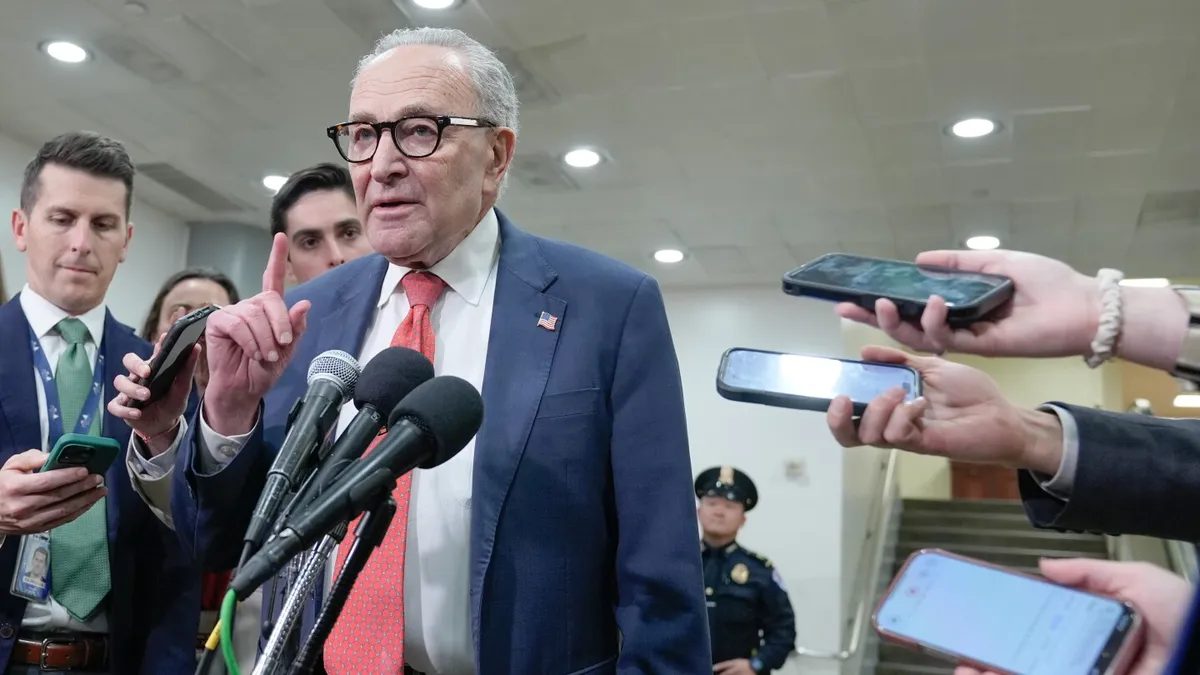
The recent agreement reached by a faction of Senate Democrats to reopen the government has reignited tensions within the party, just days after significant electoral victories had fueled optimism for a united front as they head toward the 2026 midterms. This latest division does not align neatly with the traditional divide between progressives and centrists. Instead, it reflects a growing discord regarding the approach to combatting former President Donald Trump and his Republican allies in Congress.
Some progressives have intensified their calls for Democratic Senate leader Chuck Schumer to step aside, despite his public opposition to the recent deal. This left-wing faction is outraged that eight centrist senators—none of whom are facing reelection in 2026—negotiated an agreement with Republicans that fails to secure the Democratic priority of extending Affordable Care Act (ACA) premium subsidies, which are set to expire at year’s end. They argue that this compromise indicates Schumer’s inability to maintain unity within his caucus.
Moderate Democrats find themselves in a precarious position as well, navigating the political landscape after more than a month of bipartisan agreement that the longest federal shutdown was a strategic move to leverage their limited influence in a Republican-dominated environment. Party leaders, including Schumer and House Minority Leader Hakeem Jeffries, continue to blame Republicans for the impending premium increases and other repercussions of the shutdown, but the abrupt conclusion to the standoff highlights the challenges of sustaining the fragile Democratic coalition.
“The Republicans have learned they can harm our communities and everyday people, including their own constituents, and Democrats will ultimately give in,” stated Maurice Mitchell, who leads the progressive Working Families Party. New Jersey Governor-elect Mikie Sherrill, who won her election by a significant margin, voiced that voters are seeking “leadership with a backbone” that remains resolute under pressure. She expressed concern that the Senate was on the verge of capitulation.
Those Democrats who supported the deal argue that they faced no viable alternatives, claiming that Republicans were unwilling to negotiate, and that the pressure from the prolonged shutdown had become intolerable. They noted that the Trump administration had withheld vital food assistance payments to low-income families, while airport operations were hampered due to a shortage of air traffic controllers. The agreement ultimately included a commitment from Senate Majority Leader John Thune to hold a vote in December on ACA subsidies and ensure back pay for federal workers affected by the shutdown.
Senator Jeanne Shaheen of New Hampshire stated, “This was the only deal on the table,” emphasizing the urgency of the situation. Democrats pointed to Trump's post-election demands for Republican senators to eliminate the filibuster, suggesting that he was unyielding in negotiations. “After 40 days, it wasn’t going to work,” remarked Senator Tim Kaine of Virginia, reflecting on the challenges they faced in advancing their agenda.
Many centrist and swing-state Democrats remain dissatisfied with the outcome. Notable holdouts in the Senate included Elissa Slotkin of Michigan and Jon Ossoff of Georgia, who expressed concerns about the fallout from the deal. Slotkin, who won her seat during the 2024 elections during Trump's presidency, and Ossoff, the only Democratic senator running for reelection in a state Trump won, emphasized the serious consequences of rising premiums and potential loss of health insurance for millions.
As the party grapples with these challenges, discussions around generational divides within the Democratic leadership have intensified. The eight senators at the heart of the deal do not face reelection in 2026 and their average age exceeds 65. Both Shaheen and Deputy Senate Leader Dick Durbin have announced their retirements, prompting younger Democrats, such as Shaheen's daughter, Stefany, to voice their discontent with the current leadership and the need for a more robust response to pressing issues.
The mounting criticism of Schumer reflects a broader sentiment within the party that it must evolve to remain competitive. The age and perceived disconnect of the current Democratic leaders, including President Joe Biden, who is the oldest president in U.S. history, have raised concerns among voters about their ability to resonate with the current political landscape. The legacy of Schumer has come under scrutiny, with calls for new leadership that can unify the party and effectively address the needs and concerns of constituents.
Despite the turmoil, some Democrats believe the recent negotiations have brought the healthcare debate into sharper focus, arguing that the upcoming vote will force Republicans to take a public stance on the issues at hand. “We get our day in court in December,” asserted Durbin, highlighting the potential implications of the agreement.
Progressives are already strategizing for the 2026 elections, focusing on primary contests across the board. “We don’t take pride in the capitulation of our friends inside the Democratic Party,” Mitchell remarked. “But the narrative is clear: we need a fighting opposition party now more than ever.”